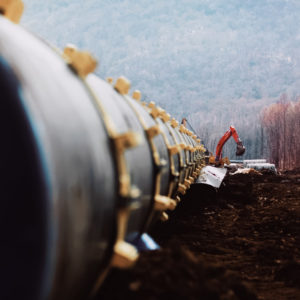As anti-pipeline activists celebrate the cancellation of the Atlantic Coast Pipeline (ACP), the unintended consequences are likely to be fewer jobs and more carbon emissions, representatives of labor and the energy sector argue.
Dominion Energy, mainly based in Virginia, and Duke Energy of North Carolina abandoned the proposed pipeline, citing “the increasing legal uncertainty that overhangs large-scale energy and industrial infrastructure development in the United States.”
“When you talk about blocking pipelines, what you’re really talking about is shutting down whole sections of our economy and forcing consumers and businesses to pay the price in terms of higher energy costs,” said Jim Snell with the Steamfitter’s Local 420, which does work on the Mariner East Pipeline and Marcus Hook terminal.
According to the U.S. Energy Information Administration, 20 percent of Northeastern households rely on heating oil as their main heating fuel, burning about three billion gallons — or about 85 percent of total U.S. residential heating oil sales. Oil heat generates both more air pollution and greenhouse gas emissions than natural gas.
“Opponents realize that natural gas has no value if it can’t get to market, so they shifted their focus from the shale fields to pipelines, investing all their time and money to delay and block energy infrastructure projects,” Snell told InsideSources. “You cannot be pro-business, pro-worker, pro-middle class or even pro-environment if you support halting projects that deliver cleaner-burning, low-cost fuel that consumers and manufacturers need.”
The ACP decision came just as a federal judge ordered yet another temporary closure of the Dakota Access pipeline, creating even more concern that a series of anti-pipeline dominos has begun to fall.
“Federal Judge James Boasberg on Monday created more risk by ordering the Dakota Access pipeline, which has been transporting oil for three years, to shut down until the government completes another detailed environmental review by which time Mr. Biden could be President and will probably pull the plug,” the Wall Street Journal editorial board wrote. “Mr. Biden has promised to revoke Keystone’s permit and is hostile to shale drilling generally.”
American Petroleum Institute President and CEO Mike Sommers underscored the same concerns.
“Between the Atlantic Coast Pipeline cancellation and now the ruling to shut down the Dakota Access Pipeline — we are deeply troubled by these setbacks for U.S. energy leadership,” Sommers said in a statement.
“Our nation’s outdated and convoluted permitting rules are opening the door for a barrage of baseless, activist-led litigation, undermining American energy progress and denying local communities the environmental, employment and economic benefits modern pipelines provide,” he said. “The need to reform our broken permitting system has never been more urgent.”
Political strategists have assumed Biden would walk a very moderate line on energy policy in a swing state like Pennsylvania in order to win back blue-collar workers — such as Steamfitters— who defected from the Democrats to hand President Trump his unlikely 2016 victory.
But recent polling shows Biden continuing to lead Trump in Pennsylvania despite his pledge to ban any new fracking — a sign that the election could be more of a referendum on the COVID-19 crisis and Trump than jobs or the economy.
One recent bright spot for the industry was a June decision by the U.S. Department of Transportation finalizing its rules to allow transport of liquified natural gas by rail. But that method is every bit as politicized and controversial as pipelines and could just as easily be overturned in a Biden administration.
Natural gas has been trading at 10-year lows as producers sit on a glut of inventory that threatens to last for months.

